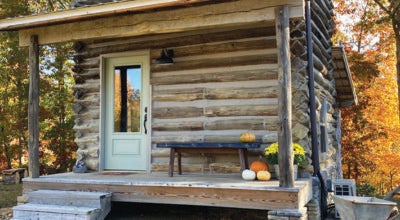Drone, vernal pools and more: Center for Environment has summer workshops for teens
Published 1:19 pm Friday, June 11, 2021
|
Getting your Trinity Audio player ready...
|
Drones and biodiversity. Green Design. Vernal pools. Climate justice. Leadership. Wilderness survival.
High school students can learn about these and other topics in a new series of one-day workshops offered during June and July by the Center for the Environment at Catawba College in Salisbury.
Called Summer Explorations, the sessions for students ages 14-17 will introduce participants to a variety of environmental areas taught by Catawba professors. “While we couldn’t hold our annual National Environmental Summit for High School Students because of Covid 19, we wanted to offer a number of day-long workshops for teenagers,” says Dr. John Wear, the Center’s executive director. “These sessions will guide the students through an exploration of environmental topics led by outstanding faculty including Dr. Luke Dollar, Dr. Andrew Jacobson, Mrs. Lisa Pope and Dr. Mercedes Quesada-Embid”. Wear will also be leading one of the sessions.
“Students respond well to the experiential learning we offer,” Wear says. “It allows them to learn through exploration and discovery.”
Students may choose one or more workshops, but an application is required for every workshop the student would like to attend. Each session, which runs from 9 a.m. to 4 p.m., costs $50, which includes lunch. Financial assistance is available. Students may visit www.Catawba.edu/explorations to apply or call 704.637.4727 for more information about the workshops or the financial assistance.
The June 22 workshop, titled BioBlitz 2021, will be taught by Lisa Pope, adjunct instructor with the Department of Environment and Sustainability. Students will race against the clock to identify and record as many living organisms as possible within a wetland ecosystem. They will learn about intensive survey strategies and collection methods as well as proper handling and identification of organisms in the field and the recording of data.
Every participant will fly a drone, inspect satellite imagery and explore camera traps and GPS collars in Dr. Andrew Jacobson’s June 16 workshop, “Can Technology Save Biodiversity?” “Planet Earth is on the cusp of the 6th great mass extinction,” says Jacobson, assistant professor of GIS and conservation.
“This one is driven not by natural or extra-terrestrial processes, but by humanity. Every inch of the planet is affected, from deforestation in the Amazon, microplastics in ocean trenches, or changing climates at the poles.” The workshop will explore the potential for technology to help save biodiversity and prevent an impending extinction crisis.
Students will focus on the concept of leadership through the lens of sustainability in a virtual session called “Sustainability Leadership through Art and Music.” Dr. Mercedes Quesada-Embid will teach the course from 10:30 a.m. until 1:30 p.m. on June 23. The cost for this virtual class will be $15. Students will explore creative ways to better understand the complex ecological, economic and social fabric of sustainability.
Participants will explore the Fred Stanback Jr. Ecological Preserve on the Catawba campus to monitor rare and endangered species in the June 30 vernal pool survey project. “Vernal pools provide vital wildlife habitat for more than 500 animal species in the eastern U.S.,” says instructor Lisa Pope. Students will monitor changes in biodiversity and help develop effective management strategies to protect endangered species during the class.
For Dr. John Wear’s July 6 session called “Designing for a Greener World” participants will have an opportunity to learn the basics of design using low-impact, environmentally friendly methods and technologies. Many of the concepts discussed have been implemented in the design of the Center building and the Catawba campus. Students will learn first-hand about creative ways to design the world around them in ways that lower our ecological footprint.
Lisa Pope will teach “Climate Action through Urban Forestry 2021” on July 13. “Trees are among the oldest living things on the planet,” Pope says. “Forests are fascinating and complex ecosystems that are a stabilizing force for the climate. I hope students will join us to learn more about resilient tree species, urban forestry and important forest management practices that can be used in their own neighborhoods to promote forest sustainability where they live.”
Participants will learn skills helpful for adapting to challenges in wilderness survival and preparation as well as techniques useful for studying wildlife in “Bushcraft and Wildlife Techniques” taught by Dr. Luke Dollar, department chair and professor of Environment and Sustainability. In the July 26 session, students will spend the day outdoors studying things like orienteering, camp selection and preparation, fire starting, tracking, trapping, darting and tagging.
Students can apply for one or more workshops. For information, call 704.637.4727.
Drones and biodiversity. Green Design. Vernal pools. Climate justice. Leadership. Wilderness survival.
High school students can learn about these and other topics in a new series of one-day workshops offered during June and July by the Center for the Environment at Catawba College in Salisbury.
Called Summer Explorations, the sessions for students ages 14-17 will introduce participants to a variety of environmental areas taught by Catawba professors. “While we couldn’t hold our annual National Environmental Summit for High School Students because of Covid 19, we wanted to offer a number of day-long workshops for teenagers,” says Dr. John Wear, the Center’s executive director. “These sessions will guide the students through an exploration of environmental topics led by outstanding faculty including Dr. Luke Dollar, Dr. Andrew Jacobson, Mrs. Lisa Pope and Dr. Mercedes Quesada-Embid”. Wear will also be leading one of the sessions.
“Students respond well to the experiential learning we offer,” Wear says. “It allows them to learn through exploration and discovery.”
Students may choose one or more workshops, but an application is required for every workshop the student would like to attend. Each session, which runs from 9 a.m. to 4 p.m., costs $50, which includes lunch. Financial assistance is available. Students may visit www.Catawba.edu/explorations to apply or call 704.637.4727 for more information about the workshops or the financial assistance.
The first session is an advocacy workshop on climate justice, scheduled for June 9. Dr. Mercedes Quesada-Embid, associate professor of environmental policy and advocacy, notes that the session will “help inform, inspire and impact positive socio-ecological change, locally and abroad.” Students will learn about climate change, how it affects their communities and how to become effective advocates for climate justice.
The June 22 workshop, titled BioBlitz 2021, will be taught by Lisa Pope, adjunct instructor with the Department of Environment and Sustainability. Students will race against the clock to identify and record as many living organisms as possible within a wetland ecosystem. They will learn about intensive survey strategies and collection methods as well as proper handling and identification of organisms in the field and the recording of data.
Every participant will fly a drone, inspect satellite imagery and explore camera traps and GPS collars in Dr. Andrew Jacobson’s June 16 workshop, “Can Technology Save Biodiversity?” “Planet Earth is on the cusp of the 6th great mass extinction,” says Jacobson, assistant professor of GIS and conservation.
“This one is driven not by natural or extra-terrestrial processes, but by humanity. Every inch of the planet is affected, from deforestation in the Amazon, microplastics in ocean trenches, or changing climates at the poles.” The workshop will explore the potential for technology to help save biodiversity and prevent an impending extinction crisis.
Students will focus on the concept of leadership through the lens of sustainability in a virtual session called “Sustainability Leadership through Art and Music.” Dr. Mercedes Quesada-Embid will teach the course from 10:30 a.m. until 1:30 p.m. on June 23. The cost for this virtual class will be $15. Students will explore creative ways to better understand the complex ecological, economic and social fabric of sustainability.
Participants will explore the Fred Stanback Jr. Ecological Preserve on the Catawba campus to monitor rare and endangered species in the June 30 vernal pool survey project. “Vernal pools provide vital wildlife habitat for more than 500 animal species in the eastern U.S.,” says instructor Lisa Pope. Students will monitor changes in biodiversity and help develop effective management strategies to protect endangered species during the class.
For Dr. John Wear’s July 6 session called “Designing for a Greener World” participants will have an opportunity to learn the basics of design using low-impact, environmentally friendly methods and technologies. Many of the concepts discussed have been implemented in the design of the Center building and the Catawba campus. Students will learn first-hand about creative ways to design the world around them in ways that lower our ecological footprint.
Lisa Pope will teach “Climate Action through Urban Forestry 2021” on July 13. “Trees are among the oldest living things on the planet,” Pope says. “Forests are fascinating and complex ecosystems that are a stabilizing force for the climate. I hope students will join us to learn more about resilient tree species, urban forestry and important forest management practices that can be used in their own neighborhoods to promote forest sustainability where they live.”
Participants will learn skills helpful for adapting to challenges in wilderness survival and preparation as well as techniques useful for studying wildlife in “Bushcraft and Wildlife Techniques” taught by Dr. Luke Dollar, department chair and professor of Environment and Sustainability. In the July 26 session, students will spend the day outdoors studying things like orienteering, camp selection and preparation, fire starting, tracking, trapping, darting and tagging.
Students can apply for one or more workshops. For information, call 704.637.4727.






